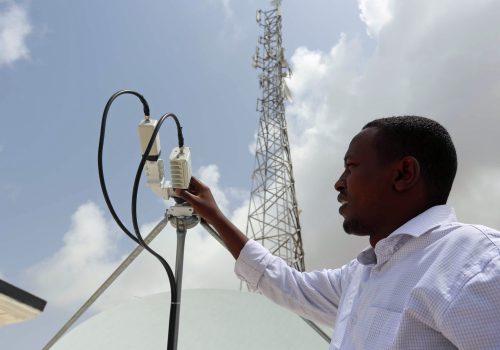Digital services for e-government: opportunities for a future 2.5 billion African demographic market
In partnership with Africa Development Solutions (ADS) Group, the Africa Center released a report on “Digital services for e-government: Opportunities for a future 2.5 billion African demographic market” by Atlantic Council, GeoTech Nonresident Senior Fellow, Nii Simmonds.
This report argues that e-government solutions have the potential to revolutionize service delivery across the African continent. E-government services refers to the process of providing technology-enabled public services. With Africa’s population projected to reach 2.5 billion people by 2050, nearly one-quarter of the world’s population, countries like Egypt, Ethiopia, Nigeria, Kenya, and the Democratic Republic of Congo will need to strengthen their government and infrastructure to manage the administration of critical services. As the middle class continues to expand, so will the demand for access to everyday services such as healthcare, renewing a driver’s license, and filing tax returns.
This report highlights the potential for growth in African markets through e-governance and the importance having strong policies and frameworks in place to secure data. Additionally, the report offers case studies on Estonia, Canada, and India, three countries that have made tremendous commitment to bridging the gap between citizens and government through digital service delivery. With key recommendations for institutions ranging from African governments and regional bodies to DFIs and private sector companies, it is clear that each have an important role to play in the digitization of public services in Africa.
About the author
Nii Simmonds is a nonresident senior fellow at the Atlantic Council’s GeoTech Center and an expert in emerging and frontier markets having held top leadership positions in corporate finance, entrepreneurial ecosystems, supply chains, and research commercialization.
Related content

The Africa Center works to promote dynamic geopolitical partnerships with African states and to redirect US and European policy priorities toward strengthening security and bolstering economic growth and prosperity on the continent.
Image: Dispatchers for the Rescue.co free ambulance service look at computer screens during the coronavirus night curfew in Nairobi, Kenya June 11, 2020. Picture taken June 11, 2020. REUTERS/Baz Ratner


